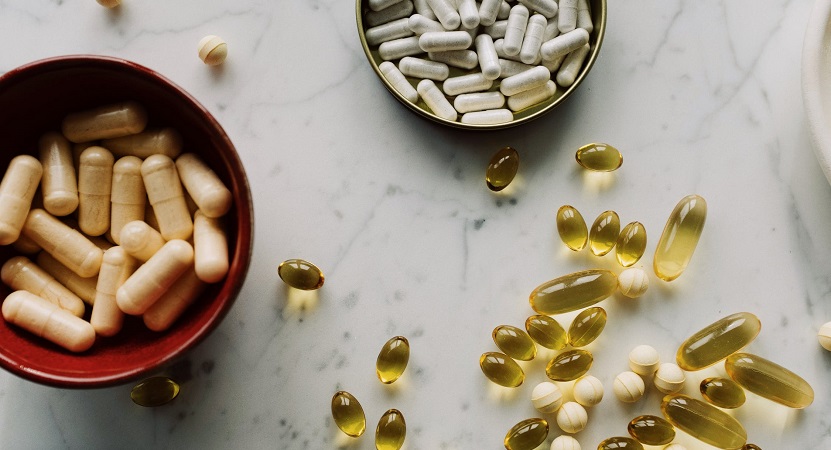The word ‘collagen’ is being tossed around more and more frequently, as human beings start to uncover the secrets of aging, and how to slow it down. A collagen supplement could turn back the sands of time as you know them, and we’ve taken the liberty of pulling everything you need to know about the best collagen supplements into one place…
In this article we discuss the following:
- What is Collagen?
- What are Collagen Supplements?
- Do Collagen Supplements Work?
- Best Collagen Supplements
What is Collagen?
When it comes to defining collagen, it helps to think about anything anyone has ever said about it in relation to the skin and aging.
Collagen, in its most natural state, is a protein. You can look at it as a type of foundational support that the skin needs in order to build itself in a healthy, stable way. The skin isn’t the only organ that benefits from this protein; collagen is an essential force for our bones, tendons and ligaments, too.
Science has shown collagen protein to make up over 75% of the skin’s support structure. It is comparable to a good mattress; a foundation that works to offer structure and support.

Collagen for skin is made up of elastic fibers and hyaluronic acid; both of these are formed by the body, for the body. The trouble is that as we age, our bodies become less and less able to fill our collagen quotas. Genetics can also affect the rate at which one is able to replenish collagen, which is why some 40 year olds can look 30, and others can look 60!
“After 30, our collagen levels start to drop by 1.5% per year. Research indicates that by the age of 40, the body’s ability to produce collagen decreases by 25%. By age 60, it has decreased by over 50%,” according to Trey Triplette, Certified Performance Nutritionist at 3natural Bionutrition®.
Environmental factors also play a role in collagen depletion year after year. Exposure to UV rays, a poor diet, a smoking habit, and even excessive drinking can all contribute to the loss of collagen at a more rapid rate than the body can replenish.
Collagen Benefits
It goes without saying that collagen proteins play a very important role in both the condition and appearance of the skin.
Collagen gives us the opportunity to delay or prevent aging in certain capacities. It works toward retaining the rigidity and texture of individual skin cells, as well as to influence the elastin fibers that give our skin its overall resilience.
When we lose our collagen over the years, symptoms include wrinkles, muscular or joint pain, or stiff ligaments. Incorporating a supplement of collagen into your diet may bring the benefit of not having to deal with any of these symptoms prematurely. This is but one of the collagen peptides benefits available to anyone willing to work with a supplemented version of this form of protein.
There are also hydrolyzed collagen benefits, which include protection against UV-induced melasma, as well as discoloration of the skin. We’ll dive deeper into these alternate forms of collagen in a bit.
One of the lesser known benefits of collagen happens to be related to cardiovascular health. Studies have repeatedly shown that consuming collagen religiously for six months or more actively improves cholesterol levels, as well as releases arterial stiffness. Over time, collagen may just reduce or eliminate the risk of contracting coronary artery disease entirely.
As J. Kelly Hoey, Author, Build Your Dream Network, puts it, “The words ‘collagen supplements’ immediately prompt you to think vanity – the aging woman grasping to hold onto her fleeting youth. Aging takes a toll on your collagen levels beyond your face! Collagen is the superglue that holds our bodies together – skin, muscle mass, joints. It’s an essential component in our vitality. To look good, you need your whole body operating at peak levels, and that, quite simply, is why I take collagen every single day.”
What are Collagen Supplements?
In theory, there are over 28 documented different types of collagen, however only types 1 through 3 are relevant to the human body.
Type 1 collagen is the protein found in human skin. It is also relevant to the teeth, bones and ligaments, as well as certain tissues.
Type 2 collagen is solely concerned with the cartilage found in human eyes.
Type 3 collagen is also found in the skin, as well as in human muscles and blood vessels. This type of collagen protein is also responsible for early infant life during the stage of embryogenesis.
A collagen supplement is a way of giving your body one or more of the listed collagen types, all from externally derived sources. Instead of relying on your body to produce collagen of its own, you’re supplying it daily, and will reap the benefits of it soon thereafter.
Collagen supplements are usually in the form of a powder-like substance, and are intended for mixing with water, juice or smoothie ingredients. This is typically the easiest way to get the collagen into the body, as chewing on a scoop of the powder is simply not going to be a pleasant experience.
Here are the four types of collagen supplements that you need to know about:
Collagen Peptides
Collagen peptides are a type of protein that are sourced in small quantities from animal products. They are either collected from bovine, porcine or marine-related sources.
This form of collagen is considered to be highly water-soluble, as well as non-gelling, which is an attractive selling-point to anyone looking to consume their collagen orally.
It is widely believed that the best source of collagen peptides are those derived from cattle bones, usually served in the form of bone broth. There are, however, many different kinds of variants of collagen peptides, and it’s great that an individual who maybe doesn’t typically consume cattle-proteins can get the same collagen benefits from peptides derived from shellfish or egg whites, instead.
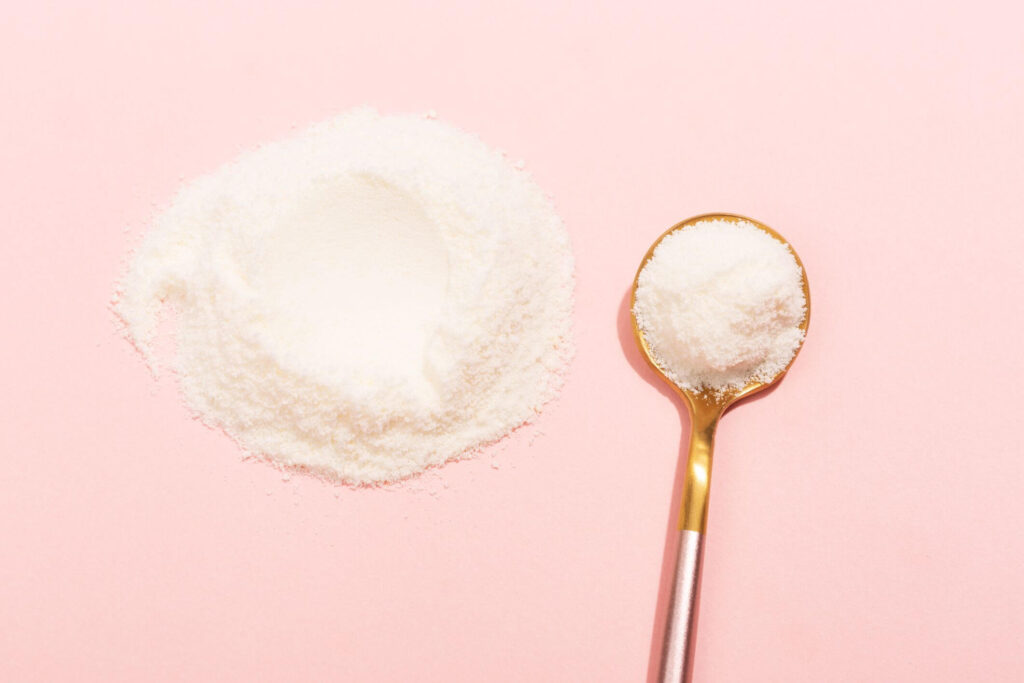
Collagen peptides are almost always sold in powdered form.
Hydrolyzed Collagen
This is where things get more technical, hydrolyzed collagen (HC) may at times be referred to as collagen hydrolysate, and collagen peptides can also be a form of hydrolyzed collagen.
This is essentially just a form of collagen proteins that have been completely broken down, making it one of the easiest collagens to absorb as a human being. Like collagen peptides, all forms of hydrolyzed collagen will be derived from bovine, marine or chicken sources. There are no plant-based forms of hydrolyzed collagen at present, which means that anyone who is allergic to beef, fish or poultry may experience adverse reactions to this kind of supplement.
Hydrolyzed collagen is one of the better supplements for individuals suffering from internal concerns, such as joint problems or pain from osteoarthritis. It ventures deep into the bloodstream with great ease, allowing it to reach such conditions without much effort at all.
Collagen Powder
As mentioned, most forms of collagen supplements are offered in the form of a powder, which is easily scooped into your morning coffee or daily smoothie bowl. The types of collagen listed above are all animal-derived, though we did insinuate the existence of another form of collagen… one derived from plants.
Thanks to groundbreaking new advancements within the market, scientists were eventually able to recreate the same amino acid compounds found in animal-derived proteins, using various plant-based alternatives. These include soy, pea protein, and hemp.
These proteins mirror those found in the animal-derived collagen supplements, and are also sold in the form of collagen powder to be stopped into your daily delivery method.
Is plant based collagen powder as effective as those sourced from bovine, or marine sources? This remains to be seen, and studies are underway to reach a universal conclusion. At present, reviews are mixed, with some individuals seeing even better success when using plant collagen over animal, and vice versa.
Collagen Pills
Scooping large amounts of powder into a meal choice once a day isn’t going to be everyone’s cup of tea. For some, the desire to take collagen is very real, however the nature of its origins can cause individuals with a weak stomach to heave at every whiff. This is unsurprising, considering bovine-derived collagen is made out of cow hides.
If you can’t quite stomach a daily dose of collagen powder, there are new collagen tablets that could bridge this gap instead. Collagen tablets contain concentrated forms of animal or plant derived proteins, and you need only take around two capsules per day to receive their benefit.
This is also a more convenient collagen alternative for individuals who travel frequently, and may not be able to carry around a large tub of collagen powder as they go. Similarly, people who spend a lot of time outdoors won’t have access to smoothie making facilities every, single morning, and thus may still enjoy the benefit of collagen through tablets.
But are these as effective as their powdered counterparts? According to Dr. Emmanuel Loucas, M.D. and Director of Lucas Dermatology & Laser Center, “There has been some evidence that taking oral collagen peptide supplements may be able to stimulate your body to produce collagen, and other proteins, like elastin and fibrillin, that help the structure of the skin on its own.”
Do Collagen Supplements Work?
Much to the distress of vegan-movements around the world, collagen supplements do seem to work symphonically with the human body, particularly those that have been in a state of disarray for the last few years.
The best way to learn about the effectiveness of collagen supplements is to speak with someone who has been on this train for quite some time. Just about everyone who starts taking collagen, sticks to it; and their monthly list of expenses has their brand of collagen powder added to it.
A massive movement is underway, and retailers seem to think that there are only two categories of customers in circulation: those who take collagen, and those who will eventually take collagen.
But, do collagen peptides work even when they aren’t animal derived? By analyzing the current consumer market, this seems to be another proud yes. The extent to which these peptides are able to deliver effect is still being assessed globally, but for the most part it’s safe to say that all consumers are seeing benefit.
How Long Does it Take for Collagen Supplements to Work?
Based on general customer feedback along, it would seem that collagen supplements take between 4 and 6 weeks to show effect. This is based on the use of the supplement daily, without neglect or skipping routine.
It’s important that anyone who is starting out with collagen for the first time, stick with it! Even if you are yet to see any results within under 6 weeks, don’t abandon all hope and flush your stash down the drain.
Collagen requires time, and it’s not uncommon for some individuals to only start reaping the rewards after 8 or even 10 weeks. Remember, your genetics and lifestyle are contributing factors, and the collagen will work as it needs to with the conditions presented to it.
Are Collagen Supplements Safe?
From a food-regulatory, basic health standard: collagen is considered to be both safe and easy to use for the general worldwide population.
This is of course dependent on the individual sticking to the stipulated daily dose, and not attempting to speed up their results by doubling their consumption. This would be an incredibly dangerous and ignorant thing to self-prescribe.
Collagen Supplement Side Effects
That said, what are the side effects of taking collagen? Though rare, there are a number of reported side effects that may come from long term consumption of this type of protein. They include heartburn, a foul taste in the mouth, and possibly a feeling of perpetual fullness in the gut.
It is essential that you comply with allergy restrictions when investing in a collagen supplement for yourself. If you’ve ever had an adverse reaction to shellfish, for example, avoid marine-sourced collagen. If eating beef typically upsets your stomach, then bovine-sourced collagen is probably not for you.
Collagen Supplements and Menopause
Menopause kicks in for most women during their 40s or 50s, with the average age being 51 in the United States. It is considered a very natural biological process, and one that is impossible to avoid.
It is estimated that women lose up to 30% of their skin collagen within the first 5 years of entering menopause. Because of the biological nature of this period of life, this loss is almost unavoidable, and thus more and more women are exploring ways in which to either delay or reduce the statistics.
Some doctors recommend starting collagen supplements from one’s early 40s, in order to counteract the skin protein loss and enjoy the many benefits that these daily doses can bring to aging skin. Hyaluronic acid is also recommended to be used in conjunction with a collagen supplement, as this adds additional support for the collagen that is actively being lost by the year.
Best Collagen Supplements
Best Collagen Powder
Orgain Grass Fed Pasture Raised Collagen Peptides
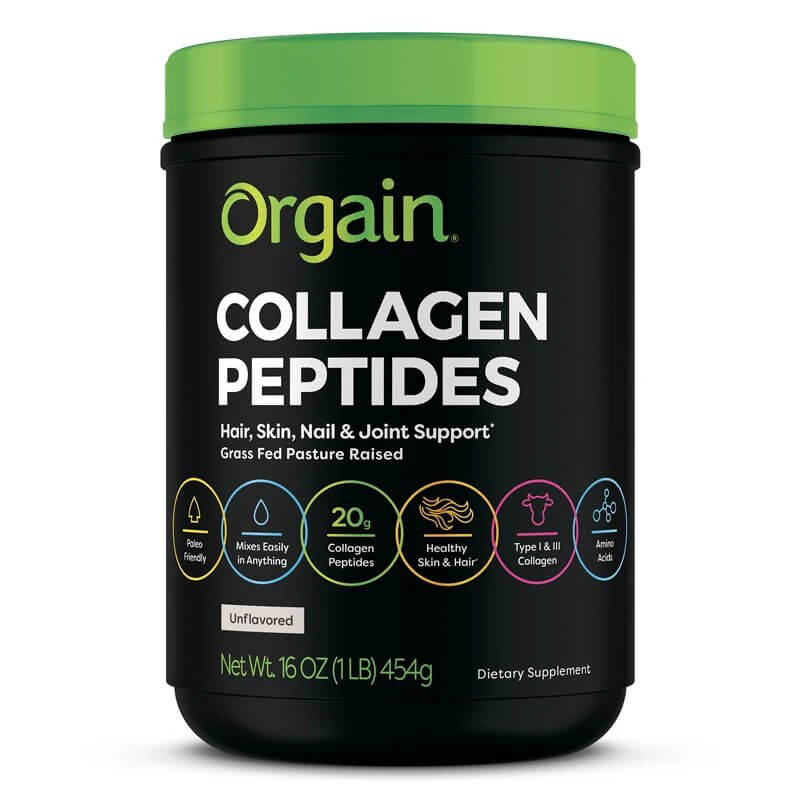
The Orgain collagen peptides are perhaps the most renowned on the market at the moment, offering a full spectrum of benefit to users. Everything from joint health, to hair and skin, can be treated through dedicated use of this particular collagen powder.
The powder is easy to mix, and dissolves into almost anything, much to the delight of their return customers. Orgain contains type 1 and type 3 collagen (as defined in the aforementioned sections).
Neocell Super Collagen
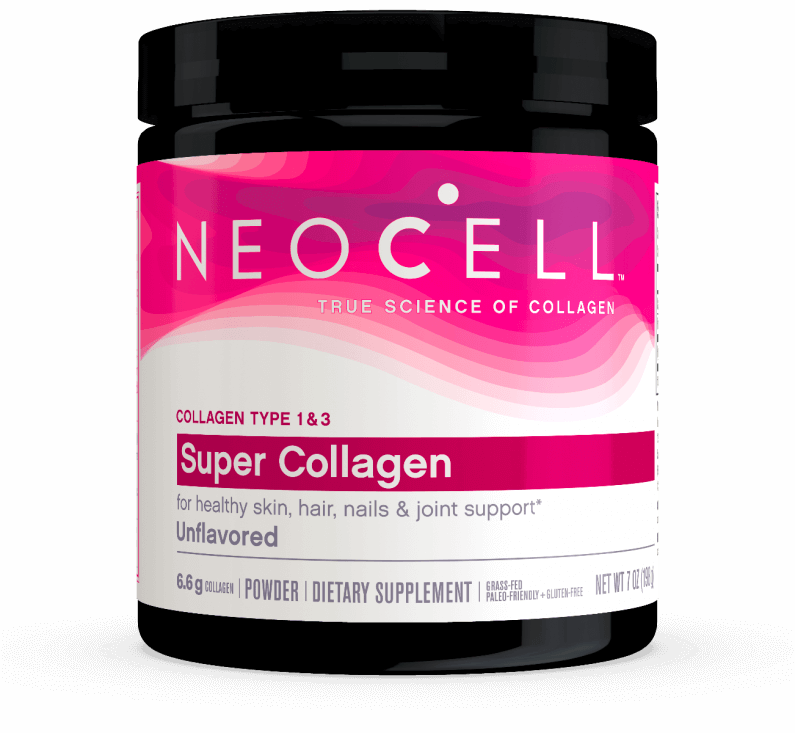
The Neocell super collagen is another full spectrum collagen treatment that works wonders for both the inside and the outside of the body.
This is hydrolyzed collagen in types 1 and 3. The collagen is exceptionally easily absorbed by the human body, and there are a plethora of positive reviews available in support of this.
This is also one of the more affordable collagens on the market at the moment.
Best Collagen Supplement for Sagging Skin
Vital Beauty Collagen
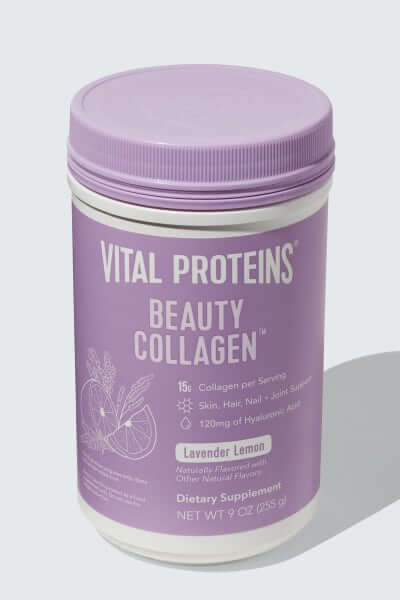
The Vital proteins collagen goes by the street name “beauty collagen”. It’s one of the best formulas on the market for sagging skin, as it works closely with the outside of the body and overall appearance of our skin organ.
The formula is specifically targeting elasticity and hydration, and anyone with scarring of the face can expect to see immense results. The formula is FDA approved and standardized.
Did we mention that there are different flavors to choose from? Enjoy collagen in flavors like watermelon mint, or tropical hibiscus.
Garden of Life Grass-Fed Collagen Beauty
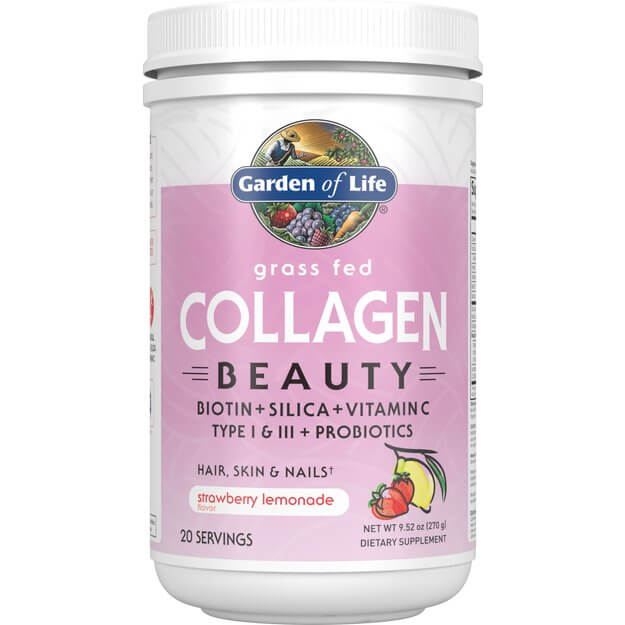
This powder formula by Garden of Life may be the overall best collagen supplement for skin that is starting to deteriorate. It’s jam packed with the necessary levels of biotin, vitamin C, silica and even probiotics.
It doesn’t get much more inclusive than this, and while Garden of Life doesn’t run cheap, you’ll be able to eliminate all other supplements that you usually use for skin, hair and nails.
Did You Enjoy This Article?
If you enjoyed this article, you might also like our articles discussing beauty and skincare such as Top 5 Vitamins for Acne, Top 17 Vitamin C Serum, and Essential Oils for Skin.

